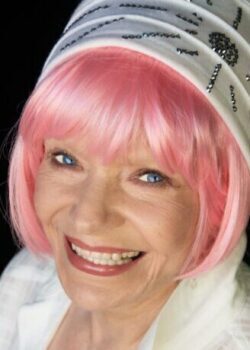Remembering Hobos During The Great Depression
I’d stand by the window in the kitchen and watch, often on tiptoes since I was barely able to see over the windowsill. The aroma of Mom’s freshly-baked bread or sticky buns would summon the hobos who occasionally shuffled past our house and I wanted to see them. All were men, each thin and bony with dull, watery eyes, looking as if someone had turned out the lights in their souls and left just a shell to wander in that place beyond despair.
One hobo would gingerly open the gate, walk down the three steps to the small area with uneven bricks at the back of our house, knock on the door and then step back, head down, not wanting to appear too bold.
My mother would open the door and the man—dirt nestled in the creases of his forehead; a tattered headband holding back greasy hair that was probably home to lice; parts of his body exposed through the holes in his filthy, worn-out clothes; a scruffy beard that hadn’t seen a razor in years; grimy hands that shook; teeth brown with rot; reeking of old urine and new booze—would ask my mother for something to eat.Even though he would normally frighten a child of three, I had seen many of those homeless, godforsaken people come to our back door and I was not afraid.
They seemed drawn especially to our house during the Depression. It was almost as if one of them had marked an “X” on our door, telling others there was sustenance at this holy place.
Hobos. The word had a respectability in our house. “It could be Jesus,” my mother would say. But even Jesus had to eat outside sitting on the steps, despite my pleading with her to let the man come in and sit at the table to eat his bread or potato soup or whatever else Mom was cooking up.
None of them looked like Jesus to me, I can tell you. A picture of Jesus hung on the wall at the bottom of the staircase in the house where I was raised and he had drops of red blood dripping from his heart which was on the outside of his body, encircled with thorns. And his moustache and beard were neatly trimmed. No, not one of them looked like that. And the hobos seemed even sadder than Jesus in that picture with his punctured, bloody heart.
The homeless people had stopped coming by the time I was eight but Mom’s goodness (not perfect—she was a venial sins type of mom) and her belief in Jesus never stopped.
Un recuerdo de los vagabundos durante la Gran Depresión
Me paraba junto a la ventana de la cocina y observaba, a menudo de puntillas ya que apenas podía ver por encima del alféizar. El aroma del pan recién horneado o de los bollos de Mamá hacía que se nos acercaran los vagabundos que de vez en cuando pasaban por nuestra casa, y yo quería verlos. Todos eran hombres, delgados y huesudos, con ojos apagados y llorosos, que parecían como si alguien les hubiera apagado las luces del alma, dejando solo un caparazón que erraba en ese lugar que está más allá de la desesperación.
Con cautela, el hombre abría la verja, bajaba los tres escalones hasta la pequeña área hecha de ladrillos desiguales que quedaba en la parte trasera de nuestra casa, llamaba a la puerta y luego retrocedía, con la cabeza gacha, sin querer parecer demasiado atrevido.
Mi madre abría la puerta y el hombre —la suciedad acumulada en los pliegues de la frente; una cinta hecha jirones aguantándole el cabello grasiento que probablemente albergaba piojos; partes del cuerpo expuestas a través de los agujeros de su ropa sucia y gastada; una barba desaliñada que no había visto una navaja en años; manos sucias que temblaban; dientes marrones por la podredumbre; apestando a orina vieja y alcohol nuevo—le pedía algo de comer a mi madre.
Aunque normalmente alguien así asustaría a una niña de tres años, ya yo había visto a muchas de esas personas sin hogar y abandonadas por Dios venir a nuestra puerta trasera y no les tenía miedo.
Todos parecían atraídos especialmente por nuestra casa durante la depresión. Era casi como si uno de ellos hubiera marcado una “X” en nuestra puerta, diciéndoles a los demás que había sustento en este lugar santo.
Vagabundos. La palabra tenía respetabilidad en nuestra casa. “Podría ser Jesús”, decía mi madre. Pero incluso Jesús tenía que comer afuera sentado en los escalones a pesar de mis súplicas para que dejara entrar al hombre y y le permitiera sentarse a la mesa a comer pan o sopa de papas o cualquier otra cosa que Mamá estuviera cocinando.
Ninguno de ellos se me parecía Jesús, lo puedo asegurar. Una imagen de Jesús colgaba en la pared al pie de la escalera en la casa donde crecí y tenía gotas de sangre roja goteando del corazón que estaba fuera de su cuerpo, rodeado de espinas. Y su bigote y su barba estaban cuidadosamente recortados. No, ninguno de ellos se le asemejaba en nada. Y los vagabundos parecían incluso más tristes que Jesús en esa foto con su corazón perforado y ensangrentado.
Las personas sin hogar habían dejado de venir cuando yo tenía ocho años, pero la bondad de Mamá (no perfecta, era del tipo de madre que cometía pecadillos veniales) y su fe en Jesús nunca cesaron.
Ellen Wood de Questa es una autora galardonada y también una artista que usa el nombre de Maruška. El sitio web de sus libros y pinturas es https://questacreative.org/ellen-wood/. Para comunicarse con Ellen escriba a ellen@howtogrowyounger.com
Traducido por Teresa Dovalpage
Author
-

Ellen Wood, born in 1936, is a prizewinning author, columnist and former management executive. After her youngest child began school, Ellen started an in-house ad agency and won 16 awards for annual report and advertising excellence, including 4 national awards. Five years after her mother died of Alzheimer’s, Ellen experienced early symptoms (she has the gene, APO-e4). At 68 she developed a program of mind/body/spirit techniques that proved so successful, she wrote and published “Think and Grow Young,” followed by “Joy! Joy! Joy!” (now retitled “The Secret Method for Growing Younger,” Volumes 1 and 2) and gave inspirational speeches. Since 2018 Ellen has been the ad agency for NorthStar Tire and Auto in Questa, NM. Ellen started painting in November of 2020, having dabbled at it in her 20s, and gave herself a new name: Maruška, her father’s middle name. She is overjoyed to be part of a big, loving, kindhearted family. You can find her paintings at www.northernnewmexicoartists.com/ellen-wood
View all posts



